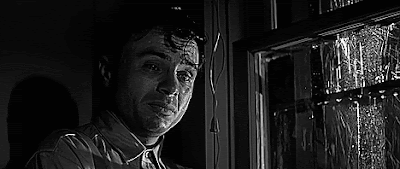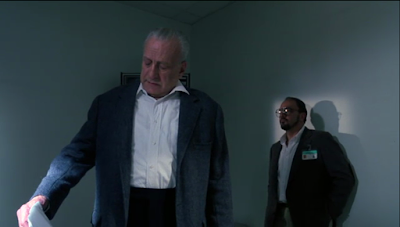In Cold Blood (Richard Brooks, 1967) The slaughter of the Clutter family of Holcomb, Kansas in 1959 by two random ex-cons was considered note-worthy—and shocking enough—that The New Yorker wanted to do a story about it. It was one of two story ideas offered to Truman Capote to write for the magazine. Capote's trip to Holcomb, accompanied by childhood friend Harper Lee, led to many interviews, 8,000 pages of notes and an escalating goal that Capote labored with until the publication of his book "In Cold Blood" seven years after the murders.* The publication became one of the best-selling books of the ghoulish genre and sparked debate over something that was called "New Journalism" where stories were written with the practices of fiction in mind, and what Capote, stoking his own embers, dubbed a "new art form, a nonfiction novel." Certainly it was different than a "just the facts, ma'am" account, but it was the first spurt in an increasingly lurid form of publication and presentation, where a moral center is replaced by an almost teasing glee for all the gory details. Just watch "Dateline" sometime ("Coming up, next...").Richard Brooks, coming off the films Lord Jim and The Professionals, was reading drafts of Capote's novel, owing to their mutual friendship. Brooks bought the film rights for $400,000 and began the process of turning it into a film with an eye towards verisimilitude, noir theatrics, and, with the help of cinematographer Conrad L. Hall, a look of neo-realism—as much as possible, the filmmakers tried to film in the actual locations, including the house where the multiple murders took place.Perry Smith (Robert Blake), newly released from prison, meets up with an old prison buddy Dick Hickox (Scott Wilson), who has word of "a big score" in Kansas, even though traveling there will break their paroles. Hickox has been told by another prisoner that $10,000 is being held in a safe by farmer Herbert Clutter, that prisoner's former employer. The film follows two parallel paths—of the day-to-day activities of the Clutters, and Smith and Hickox's travels up until the fateful night.
The next day, there's no answer at the Clutter household, but upon entering the house, a friend of one of the daughters' finds the family murdered. FBI Agents Alvin Dewey (John Forsythe) and Roy Church (John Gallaudet) arrive at the scene, stunned that the murders took place, with no fingerprints and only bloody footprints at the scene. They reveal that Clutter never kept large sums of money at the house, only writing checks in his business.
The film then follows the investigation, while tracking the path of Hickox and Smith as they make their way to Mexico and then, running out of money, back to California and eventually to Kansas. As Dewey and Church follow leads, particularly one from Hickox's old prison pal, they are joined by a reporter Bill Jensen (Paul Stewart), as they talk to family members and try to follow disparate reports to try and track down the two ex-cons. Eventually, the two are arrested, stand trial and eventually executed.The film, in wide-screen black and white, manages to fit into the genre of noir—the things Hall does with the monochrome textures is amazing, but even though the film strives for authenticity to the point of ghoulishness, there is still something just a little "off" in the way Brooks presents it. The angles are too showy, too precise, and except for a couple of shots, does not give you a "You Are There" quality ala neo-realism. It feels staged and artificial, rather than gritty and naturalistic.The film is also a bit off-center morally, too. Although much time is spent with the Clutter family before the murders take place, and the investigators are shown as diligent and professional, where the most work on the film is in the depiction of the lives of Smith and Hickox. They're the ones given the most focus and I'm not going too far and saying that they're given the most sympathy, as well. No one tries to "explain" the Clutters. No one dives into the histories of the FBI men. But, the perpetrators, the murderers, are given long sequences showing their bad backgrounds and their dysfunctional parents. At least, Brooks rejected the original casting ideas for Smith and Hickox—Steve McQueen and Paul Newman. As it is, Brooks saw fit to cast the parts with two relatively unknown actors, who still managed to make the most of their roles.
Conrad Hall's "lucky break" of the rain reflection.
Brooks saw the film as a damnation of capitol punishment, as it is. One cannot contemplate the title In Cold Blood without it reflecting both the killing of the Clutters and the state-sanctioned murders of those responsible. The death penalty's record of deterrence is only good for those that are killed, but looks mighty feeble when atrocities on the order of the ones by Hickox and Smith show up on the news every month when some wacko with a gun decides to make a name for himself (the choice of pronoun is deliberate—it's always a "him"). Bad guys should not be celebrities, no matter how low the bar for "celebrity" has sunk these days. And the justice system, built on politics, is so corrupt that one doesn't need "The Innocence Project" to speculate on how many innocent people have been killed in the name of justice. But, where's their justice? The system either works 100% of the time or we don't take actions that can't be taken back. Nobody is so infallible they can play God. That applies to good and bad alike.
In Cold Blood was voted into the National Film Registry in 2008.
Remembering the victims: the Clutter family
* Two movies about Capote with the Holcomb murders serving as the centerpiece were made, as well. Capote and Infamous
.











.jpg)





























